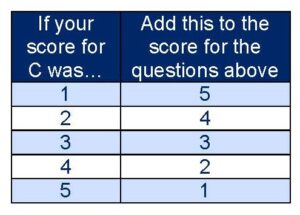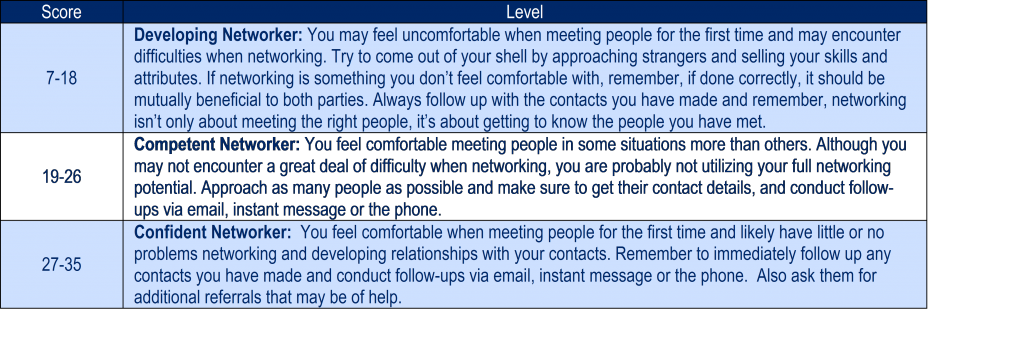Answer These 7 Questions to Tell If You’re a Great Networker

According to studies, 50%-74% of the population consists of extroverts and yet when I ask “who is an extrovert” among a room filled with equity research analysts, the response I get is 5%-20% (I’ve done this informal survey at least 30 times over the past 3 years). From my perspective, we self-selected to get into finance, rather than marketing, sales, human resources, etc. because we prefer working with numbers over people. Being an introvert isn’t a bad thing (David Letterman and Barbara Walters are self-proclaimed introverts) and in fact can help in making connections with others (discussed later).
So why does it matter that so many equity research analysts are introverts? Because we need to always be looking for differentiated sources of insight (the key ingredient for making great stock calls), which can’t be found by simply listening to conference calls, reading regulatory filings and scanning the financial media. Instead, it relies on developing relationships with information sources such as management of privately-held companies, consultants and journalists/bloggers, which requires us to move outside our comfort zone to network.
The majority of equity research analysts are introverts, which makes it even more important they know if they’re good at networking
To better help analysts assess their networking ability, I created the assessment below. Answer the seven questions, using a 5 points scale (1=never and 5=always) and then follow the scoring instructions.
Networking Self-Assessment for Equity Research Analysts
Record your answers for the questions below, with 1=Never, 5=Always
- When information is critical to my valuation, I typically try to validate it using independent sources, rather than only the company’s management
- I hand out business cards, including to people who may not have a formal relationship with me or my firm
- When developing assumptions about my companies, my primary source of insight is from the company and financial press
- I have more connections than most of my friends on LinkedIn, Facebook or other professional and personal networks
- When researching a critical factor that is likely to impact my stock, I have a wide network of contacts to speak with for insights.
- I ask colleagues and established industry contacts for names of other people who can help me in my efforts
- I cultivate new sources of information, independent of company management
Scoring:
- Step 1: Add up your scores for ALL BUT question C
- Step 2: Convert your score for question C, by using the following table:

- Step 3: Add Steps 1 and 2 for your total score:
- Step 4: Review the scoring key below:

If you received a high score, congratulations because you’ve overcome one of the greatest challenges as an analyst, by becoming great at networking. But if you received a low score, you might find value in these posts:
- A framework for building sources of insight
- People to turn to in order to get these insights
- Methods for cultivating a solid list of these people
Before I end, if you’re wondering why being introverted can actually help in networking, here are some thoughts from Andrea Nierenberg who has written a number of good books on networking, including Essential Business Networking Tips, Tactics and Tools You Can Use:
- Introverts are usually great listeners. They would rather let another person do the talking, and that shows respect toward their colleague
- They remember details about their contacts, which others might miss. Because they are listening, they can take in more information about their contact
- They focus on the person they are talking to, making that person feel significant
- They build sound relationships and care for them because they are often helpful individuals who watch out for others
- They find the right time to speak— never interrupting or asserting their opinions
- They are helpful, which often makes others want to be helpful in return
- They network very well in situations where they can use their skill to help others.”
If you’re among the 70%-85% of analysts who are introverts, I’m not trying to get you to change your personality (I’m an introvert) and suddenly become the life of the party. But it’s important to know that being an introvert can hinder a key part of the job, specifically networking, which means it may be an area for development. If you’re interested in exploring this topic further, AnalystSolutions provides equity research training with a specialized workshop to help analysts improve their network of information sources, Generate Differentiated Insights Through Better Discovery, Questioning, and Influencing.
Because networking is important for information gathering (which is necessary for forecasting and stock picking) as well as communicating your stock call to others, this Best Practice Bulletin™ targets many parts of our Pathway to Success Framework: #1. Generate Informed Insights, #2. Accurately Forecast, #3. Make Accurate Stock Recommendations, #4. Motivate Others to Act, #5. Acquire Buy-Side Votes (Sell-Side Only).
Improve you or your team’s stock picking and communication skills with our equity research analyst training tools, which includes workshops such as the one above, as well as our GAMMA PI™ assessment and one-on-one coaching. Also, consider ordering the book that inspired the founding of AnalystSolutions and the Best Practices Bulletin: Best Practices for Equity Research Analysts.
Visit our Resource Center to find more helpful articles, reference cards, and advice towards your growth as an Equity Research Analyst.
©AnalystSolutions LLP All rights reserved. James J. Valentine, CFA is author of Best Practices for Equity Research Analysts, founder of AnalystSolutions and was a top-ranked equity research analyst for ten consecutive years